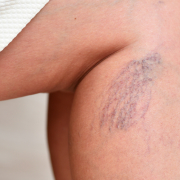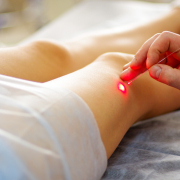Varicose Veins: Are They Dangerous?
It’s commonly believed that varicose veins are an inevitable part of aging. Most of the time, the visibly blue and purple veins around the legs bring no harm to people who see them as nothing more than a passing concern or a cosmetic problem. However, in some cases, varicose veins may signal an underlying circulation condition that you should address promptly.
What Are Varicose Veins?
Veins can enlarge or become varicose when the vein walls or valves weaken, causing blood to flow backward and pool in your veins. As a result of the increased pressure, they can stretch and protrude. If it is close to the surface of your skin, it can be visible.
Varicose veins can appear anywhere on the body, but the veins in your legs and ankles are the most commonly affected areas due to the heightened pressure on your lower body from constant standing and walking.
For some people, varicose veins bring persistent pain and discomfort. Symptoms might include swelling in your lower legs accompanied by a burning sensation, soreness behind the knee, and itching around the veins. You might also find that your leg muscles tire easily after a workout that you used to perform with ease.
Complications of Varicose Veins
If left untreated, a varicose vein might cause more than just pain and lead to severe complications. Some of these are:
Blood Clot
Since the veins in your legs work harder to overcome gravity and pump blood from your lower extremities to your heart, normal blood pressure may not be enough to push the blood upward, accelerating varicose vein development. The natural aging process can also cause changes in your blood vessels affecting properblood circulation and can cause a blood clot to form in your veins. If this occurs near the surface of your skin, it is called superficial thrombophlebitis.
If you feel any swelling or your leg feels warm to the touch, it might indicate a deep vein thrombosis (DVT). DVT may occur in severe cases of varicose veins, and this happens when a blood clot forms deep in your body. It can be fatal if it breaks loose and travels to your lungs, a complication that restricts oxygen and blood flow called pulmonary embolism.
If the pain becomes severe enough to interfere with your everyday activities, it’s best to consult a specialist. They can help you check if there are lifestyle changes you can make to minimize the discomfort and reduce the risk of other vascular diseases.
Bruising and Bleeding
If the pressure in the vein walls builds up, your varicose veins may burst or rupture, causing internal bleeding and leaking blood into surrounding tissues. When this happens, your leg will discolor or take on a bruised appearance.
Severe cases of varicose veins located too close to the skin surface may explode and cause external bleeding on rare occasions. Any case of bleeding due to varicose veins requires immediate medical assistance.
Skin Ulcer
When the enlarged vein does not receive sufficient oxygen, an ulcer or a skin sore may form near the vein, often near your ankles. Before the ulcer forms, you will notice a discolored spot.
Ulcers take time to heal because the swelling spreads to the surrounding skin and soft tissues. Advanced vein diseases that have resulted in ulcerations may require vein surgery. In this procedure, a vein doctor will remove the damaged veins and reroute the blood flow.
Varicose Vein Treatment in Kansas City, MO
Vein diseases are progressive conditions, often with no visible symptoms at the onset. As the disease becomes more severe, it can physically manifest on your skin as varicose veins. Left untreated, it can develop into painful, dangerous, and life-threatening conditions.
To improve health outcomes, visit the experts at Missouri Vein Specialists in Kansas City, Missouri, for quality diagnosis and treatment. We use advanced technology to evaluate the health of your vascular system, diagnose any issues, and provide the right treatment for your condition. Our team is led by Dr. Scott Darling, one of the first doctors to be certified by the American Board of Venous and Lymphatic Medicine in 2009.
If you have any questions or would like to schedule a consultation with the best vein doctor in KC, call us today at (816) 792-3400 or fill out our online appointment request form. We look forward to serving you!












